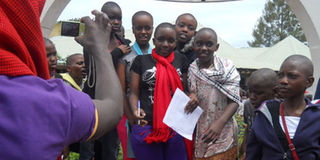Study trips: preparing children for safe travel

Pupils of Sir Apollo Kaggwa Primary School at the Equator during one of their study trips. File photo
What you need to know:
Are you the kind of parent that never goes beyond paying for their child’s school trip? Well, the study trip package requires more than that from you and the teacher.
It’s that time when schools organise study trips for their pupils and students. The fun, adventure and of course learning that takes place makes these study trips a must go for any child.
And most importantly, taking students for field trips can be a valuable and an additional step to their healthy growth, especially for the preschool children.
A successful field study is one that has educational objectives plainly defined and the activities planned to achieve the stated objectives stated. When the trip is well designed and planned, the likelihood of its success is high. Here is a simple guide indicating some of the roles both the parents and teachers should play during the study trips.
The teachers’ roles
The teachers should attain parents’ approval for the pupils to take part in the study trips. The children should be given a written description of the trip to take to their parents or guardians. The document may contain information about the safety precautions to be taken, types of clothing to be packed for the child, and a parental approval form for them to sign. It is also advisable, on the day of the field study to post on the classroom, laboratory door or any other conspicuous location , a note indicating the destination of the class trip, the departure and return time.
Participation
A primary seven class teacher only identified as Lillian urges fellow teachers to determine the appropriateness of the field study for all students based on any physical disabilities, allergies, or other conditions that could impair or limit their participation.
It is also advisable to compile a list of all students participating in the trip and provide a copy to the school administration.
Preparations
The class teachers may come up with suitable arrangements with the specific education staff, school nurse, and parents for students with special needs. Chris Male, a travel agent says class teachers should arrange for transportation to the place using a transport system approved by the government (buses, mini-buses and taxis not lorries or pickup trucks.
“During the organisation of a trip to a facility such as a factory, an experienced facility representative should conduct the tour around the factory since he or she is well aware of the hazards and dangers in the facility. The visit should be well supervised by the teacher in-charge or class teacher,” he adds.
Rules
Lillian also advises fellow teachers to follow the rules a school comes up with relating to field trips and make sure students know whether or not regular school rules apply during the field study trips. She advises the teachers to inform students of any specific school rules that apply during field trips.
“Before each trip, teachers should establish the rules for safe student conduct and explain the rules to all the participating students to avoid problems during the study trip,” she adds.
Inspect study trip destination site
Morris Oketch, a former worker at Uganda Wildlife Centre, proposes that the school authority should first visit the site or facility prior to the trip and conduct a survey of the area. The survey should include identification of conditions that could cause students to fall, such as slippery and sharp rocks and unstable or rolling objects incase of visiting mountainous areas.
“Deep water or currents strong enough to sweep students off balance, animals capable of injuring students, including poisonous or venomous animals, ticks, or mites and potentially allergic substances should be noticed to improve on the safety of the visiting children, ” he adds.
The parents’ roles
After the parents have signed the parental approval form, they are mandated to clear the trip fees and prepare the child for the trip. Know the location of the site, the duration and purpose of the study trip and the return date.
Parents should park the right clothes indicated in the letter issued by the school authorities.
The essentials that should not be forgotten include a sweater, medication (if any), handkerchiefs and a blanket (for trips that take more than a day). A back-pack is more appropriate for a study trip because it can carry both eats and clothes.
Lillian appeals to the parents to disclose any allergies that a child may have to the in-charge of the trip before leaving for the study trip to avoid any problems.
“Parents are advised to obtain the telephone contact of the class teacher or the teacher in-charge so that the child keeps in touch with his or her parents and in case of any emergencies, they can easily be reached,” she adds.
The children may need to buy something on their way to the site. It is therefore necessary to give them money. However, avail him or her with smaller denominations instead of a big note so that they are not cheated. This and much more will lead to a successful study trip for your child.




